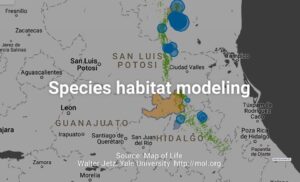The startup untangling the hair extension plastics problem

Rebundle — a women-led team building the first U.S.-made, plant-based hair extensions brand — in early June won the Circularity 23 Accelerate fast-pitch competition of circular economy startups.
Ciara May, founder and CEO of Rebundle, was the first of five entrepreneurs to pitch to over 1,200 professionals building circular economic business models. She won the audience vote with the appeal of Rebundle’s two-pronged impact, stating from the main stage: “As a Black woman who’s been wearing braids all my life, I recognized that not only was [plastic synthetic hair] a health concern but an environmental justice issue that’s been overlooked for decades.”
The hair extensions market is expected to nearly double to $11.8 billion by 2030, according to some projections. The problem Rebundle seeks to address is substantial: 30 million pounds of plastic hair end up in landfills each year.
Rebundle’s patent-pending ReGen Hair Fiber is made, instead, from naturally extracted banana fiber. The material is 97 percent bio-based and compostable, making Rebundle the first hair extensions company to earn the USDA Certification for Biobased Product Label. The startup, based in St. Louis, also facilitates a recycling program to repurpose plastic hair into outdoor furniture and decking, diverting it from landfills. With the help of its recycling partner 5 Media, Rebundle said it has recycled 445 pounds of hair to date.
From a health perspective, May said one in three women experience scalp irritation from plastic synthetic hair, which contains endocrine-disrupting chemicals. Rebundle’s banana fiber extensions eliminate the use of these toxins, improving comfort and health outcomes, according to May.
Rebundle was founded in 2019 and has raised $2.5 million, not counting the $20,000 it received from GreenBiz Group for winning Circularity Accelerate. The startup sells through its website and plans to sell directly to salons and big-box retailers.
Other startups that competed in Circularity Accelerate included Molg (circular manufacturing for electronics companies using robotics); Fortuna Cools (turns farm waste into insulation and textiles); Samsara Eco (enzymatic breakdown of plastics for reuse); and Azure Printed Homes (3D printing of homes with recycled polymers).
This software helps Siemens, Bayer and Mitsubishi manage net-zero goals

San Francisco-based software company Sinai Technologies sells an application that helps companies including Siemens, Mitsubishi and Bayer create a decarbonization strategy aligned with science-based target guidelines.
Sinai’s software does this by inventorying and forecasting emissions across a company’s entire operations and value chain, according to the company’s website.
With Siemens, for example, Sinai moved emissions data collection processes being cataloged in spreadsheets to a cloud-based platform. This allowed Siemens to create a single source of truth for its greenhouse gas emissions data. That, in turn, will help the company create actionable decisions to meet its climate neutrality goals by 2025 and 2030, according to Sinai.
The company has attracted significant capital to scale its mission, including a Series A round of $22 million last fall to build out its software and pursue international partnerships. That investment brought total funding for Sinai to $37 million.
NEC, a global leader in advanced IT and network technologies, was an investor in that latest infusion via its corporate venture capital fund, the NEC Orchestrating Future Fund (NOFF). Sinai is partnering with NEC to provide a comprehensive platform designed to help companies decarbonize their business operations. Through this partnership, NEC will combine its data collection expertise with Sinai’s emission measuring and reporting capabilities. This will allow the partners to make holistic recommendations to companies seeking to reach net-zero goals.
With so many carbon accounting companies in the market, what sets Sinai apart is its fully integrated carbon footprint calculations, along with its ability to build custom strategies for carbon pricing and reducing emissions across an entire organization.
Finance and tech team up to solve flooding

The cost of flooding in the U.S. has totaled $850 billion since 2000, comprising two-thirds of the price from all natural disasters. To make matters worse, most flooding damage isn’t covered by insurance, wiping out 40 percent of small businesses in its wake. The world needs new tools to anticipate, track and deal with flooding as climate change makes it more frequent and widespread.
Enter Floodbase, a female-founded series A startup disrupting the insurance and flood-mapping industry for homeowners, businesses and government. Floodbase offers data solutions that expand insurance coverage while enabling policyholders to receive near real-time payments in the case of a trigger event (such as a natural disaster). This model is known as parametric insurance. Typically, affected communities receive payments from insurance companies weeks or months after the disaster. This delay hinders quick access to financing, which is crucial during emergency responses to provide communities with food and clean water, for example.
Floodbase is also reinventing the flood-mapping process. Traditionally, to understand flood patterns and make predictions, large amounts of ground equipment are required to run simulations. Floodbase flips this model on its head, gathering real-time accurate data. Instead of simulations, Floodbase trains machine-learning tools to recognize water in satellite imagery. The AI identifies pixels in the image that represent water, capturing floods in real time across the globe, alerting communities for evacuation purposes and ultimately accurate and fast insurance payments.
In January, Floodbase raised $12 million in Series A funding from Lowercarbon Capital with participation from Collaborative Fund, Floating Point and Vidavo. Its customers include the U.N., FEMA and governments around the world.
Liminal is recharging EV battery production

If you haven’t heard, the electric vehicle (EV) revolution is upon us. Legislative incentives are championing the purchase of EVs and breaking down barriers that previously hindered charging infrastructure development across the country. And as demand for EVs grows, so does demand for EV-compatible battery production. That’s where Liminal comes in.
California-based startup Liminal is a battery cell manufacturing intelligence provider that combines ultrasound technology with machine learning to advance battery production insights. It does this via EchoStat, a high-speed ultrasound inspection solution designed to be used throughout the battery manufacturing process. EchoStat detects and corrects anomalies in real time, preventing accelerated deterioration or system failure once installed in the EV.
“Our products help battery manufacturers hit their aggressive production volume and cost targets, while ensuring their cells meet stringent EV safety and performance requirements,” said CEO and co-founder Andrew Hsieh to Business Insider.
Liminal received $17.5 million in its Series A2 round in February, led by ArcTern Ventures with support from Northvolt and Ecosystem Integrity Fund. In May, the startup was awarded a $2.75 million grant from the California Energy Commission to further develop EchoStat.
- SEO Powered Content & PR Distribution. Get Amplified Today.
- PlatoData.Network Vertical Generative Ai. Empower Yourself. Access Here.
- PlatoAiStream. Web3 Intelligence. Knowledge Amplified. Access Here.
- PlatoESG. Automotive / EVs, Carbon, CleanTech, Energy, Environment, Solar, Waste Management. Access Here.
- BlockOffsets. Modernizing Environmental Offset Ownership. Access Here.
- Source: https://www.greenbiz.com/article/4-climate-tech-startups-watch
- :has
- :is
- :not
- :where
- $UP
- 000
- 1
- 200
- 2019
- 2025
- 2030
- 23
- 3d
- 3D Printing
- 75
- 8
- a
- ability
- accelerate
- accelerated
- access
- According
- Accounting
- accurate
- across
- address
- advance
- advanced
- After
- aggressive
- AI
- aligned
- All
- allow
- allowed
- along
- also
- amounts
- an
- and
- Andrew
- anticipate
- apart
- appeal
- Application
- ARE
- around
- AS
- attracted
- audience
- Banana
- barriers
- based
- battery
- battery production
- Bayer
- BE
- been
- being
- Billion
- Black
- brand
- Breakdown
- Breaking
- brought
- build
- Building
- business
- business operations
- businesses
- but
- by
- california
- capabilities
- capital
- Capturing
- carbon
- carbon footprint
- case
- cell
- Cells
- Center
- ceo
- Certification
- chain
- championing
- change
- charging
- circular economy
- Climate
- Climate change
- Co-founder
- collaborative
- collection
- combine
- combines
- comes
- comfort
- commission
- Communities
- Companies
- company
- Company’s
- competed
- competition
- comprehensive
- comprising
- Concern
- contains
- Corporate
- corporate venture capital
- Cost
- counting
- country
- coverage
- covered
- create
- crucial
- custom
- Customers
- damage
- data
- Date
- deal
- decades
- decarbonization
- decisions
- delay
- Demand
- designed
- develop
- Development
- directly
- disaster
- disasters
- does
- double
- down
- during
- each
- Early
- earn
- Economic
- economy
- ecosystem
- Electric
- electric vehicle
- Electronics
- eliminate
- emergency
- emission
- Emissions
- enabling
- end
- energy
- ensuring
- Entire
- entrepreneurs
- environmental
- equipment
- Ether (ETH)
- EV
- Event
- example
- Expand
- expected
- experience
- expertise
- extension
- extensions
- facilitates
- Failure
- Fall
- farm
- FAST
- February
- financing
- First
- five
- Flips
- floating
- flood
- food
- Footprint
- For
- Founded
- founder
- Founder and CEO
- frequent
- from
- fully
- fund
- funding
- further
- future
- GAS
- gathering
- Global
- globe
- Goals
- Government
- Governments
- grant
- greenhouse gas
- Greenhouse gas emissions
- Ground
- Group
- Grows
- guidelines
- Hair
- head
- Health
- heard
- help
- helps
- hinders
- Hit
- holistic
- Homes
- http
- HTTPS
- i
- identifies
- image
- Impact
- improving
- in
- Incentives
- include
- included
- Including
- industry
- Infrastructure
- infusion
- Insider
- insights
- instead
- insurance
- integrated
- integrity
- Intelligence
- International
- into
- investment
- investor
- issue
- IT
- ITS
- January
- jpg
- june
- Justice
- known
- large
- Last
- latest
- leader
- learning
- Led
- Legislative
- Life
- Louis
- machine
- machine learning
- made
- Main
- make
- MAKES
- Making
- manage
- Manufacturers
- manufacturing
- many
- Market
- material
- Matters
- May..
- measuring
- Meet
- million
- Mission
- model
- models
- more
- most
- moved
- my
- Natural
- Near
- nearly
- needs
- net-zero
- network
- New
- of
- Offers
- on
- once
- only
- Operations
- or
- organization
- our
- out
- outcomes
- Outdoor
- over
- participation
- partner
- partners
- Partnership
- partnerships
- patterns
- payments
- percent
- performance
- perspective
- Pitch
- plans
- plastic
- plastics
- platform
- plato
- Plato Data Intelligence
- PlatoData
- Point
- Polymers
- pounds
- preventing
- previously
- price
- pricing
- printing
- Problem
- process
- processes
- Product
- Production
- Products
- professionals
- Program
- projections
- provide
- provider
- purchase
- purposes
- pursue
- raised
- reach
- real
- real-time
- real-time payments
- receive
- received
- recognize
- recognized
- recommendations
- recycling
- reducing
- reducing emissions
- Reporting
- represent
- required
- Requirements
- retailers
- reuse
- Revolution
- robotics
- round
- Run
- s
- Safety
- Said
- satellite
- satellite imagery
- Scale
- seeking
- Seeks
- sell
- Sells
- Series
- Series A
- Series A funding
- series a round
- Sets
- she
- Siemens
- significant
- since
- single
- small
- So
- Software
- solution
- Solutions
- SOLVE
- some
- Source
- Stage
- startup
- Startups
- stating
- strategies
- Strategy
- substantial
- such
- support
- synthetic
- system
- Target
- targets
- team
- tech
- tech startups
- Technologies
- Technology
- textiles
- that
- The
- the world
- their
- These
- this
- three
- Through
- throughout
- time
- to
- tools
- Total
- track
- traditionally
- trains
- trigger
- truth
- TURN
- turns
- two-thirds
- typically
- u.s.
- Ultimately
- ultrasound
- understand
- upon
- us
- use
- used
- using
- value
- vehicle
- venture
- venture capital
- venture capital fund
- Ventures
- via
- volume
- Vote
- Wake
- was
- Waste
- Watch
- Water
- Website
- Weeks
- What
- which
- while
- widespread
- will
- winning
- wiping
- with
- woman
- Won
- Word
- world
- worse
- year
- you
- zephyrnet









